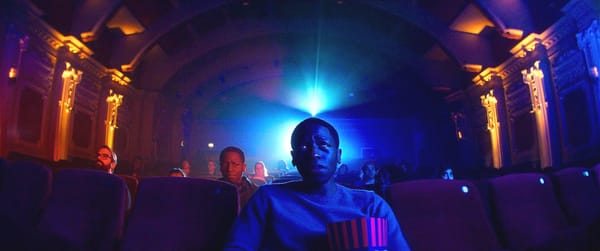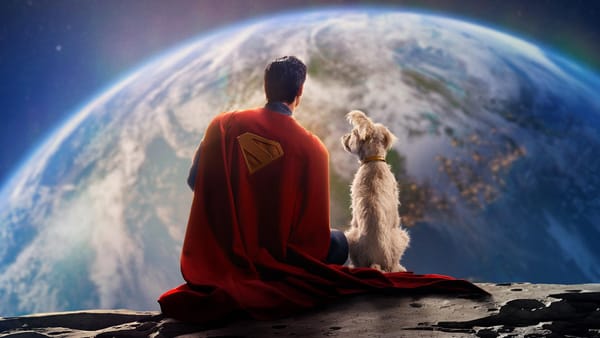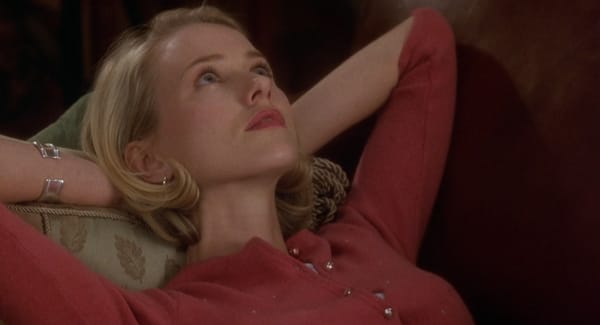The 20 Best Movies of 2023
What to Watch While Waiting for the End of the World
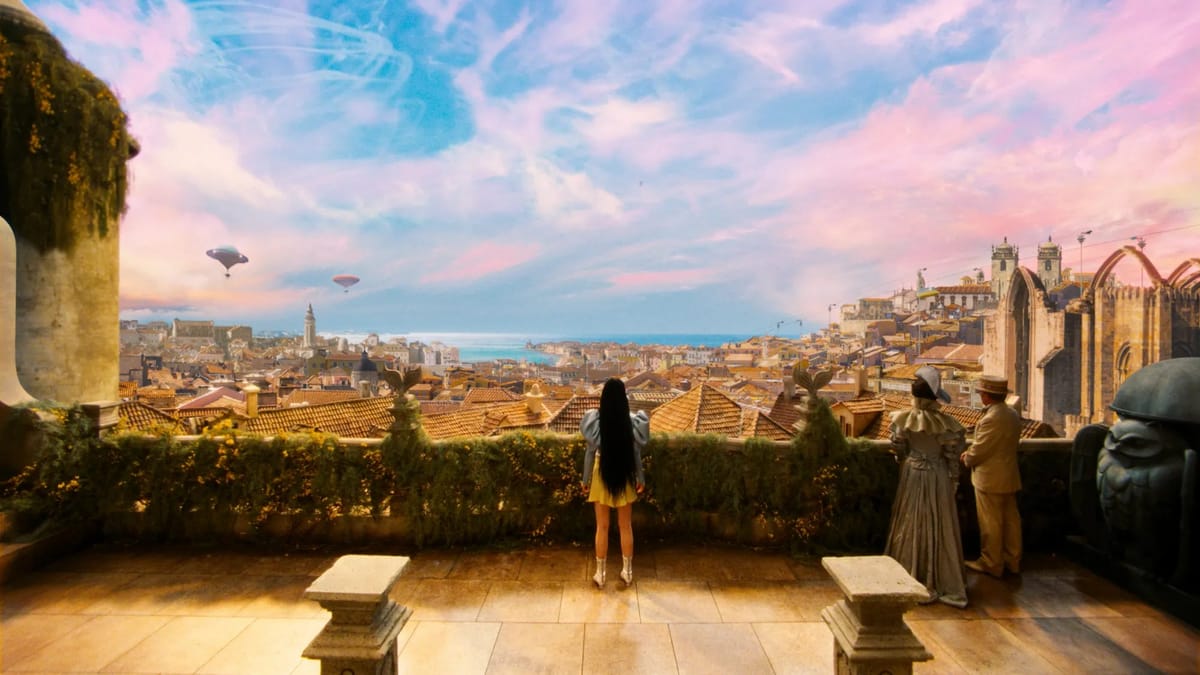
It has been a bleary, weary, worried year. We are coming up on the fourth anniversary of COVID, the second anniversary of the Russian invasion of Ukraine, the third month since Hamas attacked Israel, and another day of brutal, needless mass extinction in Gaza. Oh, and the 50th year or so of ignoring climate change. All this in the 7th year of Our Dark Lord, Donald Trump. He’s not the president anymore, but you wouldn’t know it from the media coverage.
I apologize to my readers, but it has been difficult to treat the movies as a distraction of any serious value in 2023. There are films I have loved, and they are listed below in a rough and spurious order of how much I loved them. I do this because it is expected of a movie critic, because I have been publishing year-end lists for 33 years now, and because you signed up for it and/or are paying for it. All eminently sensible reasons. And presumably you come here to escape the world‘s bleakness and just want to find something to watch on Hulu tonight, for God’s sakes. So, yes, the last thing you want is some Mopey Morty of an aging entertainment journalist harshing what may already be a pretty harsh vibe.
But movies – commercial narrative movies – are one of the things Americans use to insulate and anesthetize themselves from suffering, out there and at home. Movies and TV series and TikToks and YouTube videos and sports and gaming and a million amusements, all designed to distract us, for a fee, from the fact that we’re not here very long and that every moment is precious. We have built a colossus of make-believe, our very own Matrix, and have sold it to the world. None of this is news. But the cries from outside the multiplex seem to be growing louder.
Next year, Americans get to choose whether they want to have a democracy anymore, or whatever it is they call by that name. Because I am hopeful and privileged and naïve, I believe they will make the correct choice, and then the harder work will begin of restoring rights, rolling back bad laws, fixing a broken Court, and so on. But I’d be a fool not to hold my breath, and so would you.
As a mirror of popular culture, meanwhile, the movies have always reflected us – where we are, where we’ve been, where we like to think we’re going. Within limits, though – the Vietnam War never showed up in America’s movie theaters while it was happening, and neither has COVID. And because movies take a few years to get written, green-lit, shot, and edited, we’re always looking at a reflection that’s slightly out of date, like the light from a nearby star. The stars that have moved farther away are sometimes the most alluring; I wrote a piece for the Washington Post last week on the 50th anniversary of “The Sting” that got over 1,000 comments of blissful, thankful nostalgia.
All of this is to note that the films that spoke to me this year didn’t have much to say about this precise, terrible moment in which we live. Perhaps the films of five years from now will. (Perhaps “Oppenheimer” would have if its third act hadn’t drained the momentousness of the first two-thirds. IMHO.) It may be that the most present-tense film in my Top 20 is the one that takes place 80 years ago outside the walls of Auschwitz, a movie very much about looking at something while steadfastly refusing to see it.
My top pick, by contrast, is a dizzying pilgrim’s progress through idealism, hedonism, cynicism, capitalism, socialism, nihilism, and back out the rabbit hole into enlightened altruism; that it features major motion picture stars, sex scenes, and digital effects is only because audiences expect certain things when they go to the movies. Otherwise, it’s a film that renewed my faith, and not just in the future of cinema.
My second pick is a surpassingly graceful reminder that “now is now,” that nothing truly matters but this moment and, yes, that is me getting Zen-ny on you again. But there’s Lou Reed on the soundtrack, so that’s cool.
My third is a monster movie where we have to decide who the monster is. My fourth is a love story that didn’t happen and a marriage that did. And so on. Every movie ever made is a window onto a world that didn’t exist before the final edit was locked, but this was one of those years in which the windows failed to add up. It happens. Maybe the world I was looking for wasn’t there. Maybe you and I will have to make it.
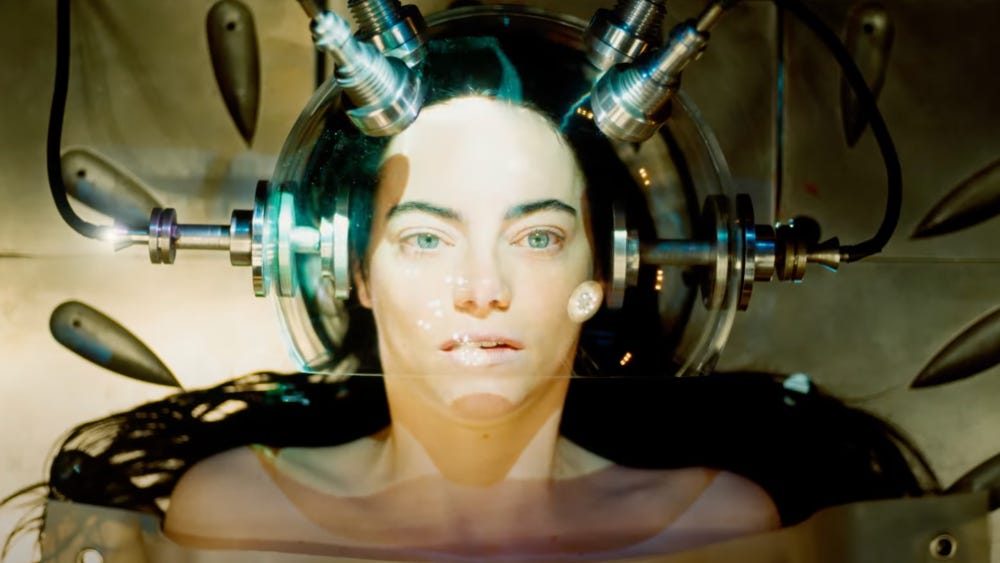
“Poor Things” – A joyously baroque creative electricity zaps through this fable of empowerment, and it’s a toss-up as to who’s the madder genius: Willem Dafoe as a stitched-together riff on Dr. Frankenstein, or Yorgos Lanthimos, the director-ringmaster of a riotous three-ring circus. With Mark Ruffalo wallowing in comic sleaze as a prissy rake, the when-worlds-collide pairing of comedian Jerrod Carmichael and German film legend Hanna Schygulla, and the cheerfully simian Kathryn Hunter as a procuress, “Poor Things” is still owned lock, stock, and refurbished barrel by Emma Stone as Bella Baxter, child of her own womb and Victorian heroine of her own making. There are films that work hard to maintain an illusion of realism and there are those that bolt together entirely new planets from the flotsam and jetsam of history and art; like “The Shape of Water,” this is a deliriously handcrafted example of the latter. Above all, “Poor Things” is a comedy of heart and mind, weirdness and womanhood, from a director not previously known for his sense of humor and an actress not previously known for her daring. What we have here is a steampunk “Candide” reverse-engineered for an era that has lost faith in everything and a movie that for all of its wide-angle frippery and furious jumping is splendidly rational. In a deranged 2023 that may be the most radical act of all. (In theaters.)
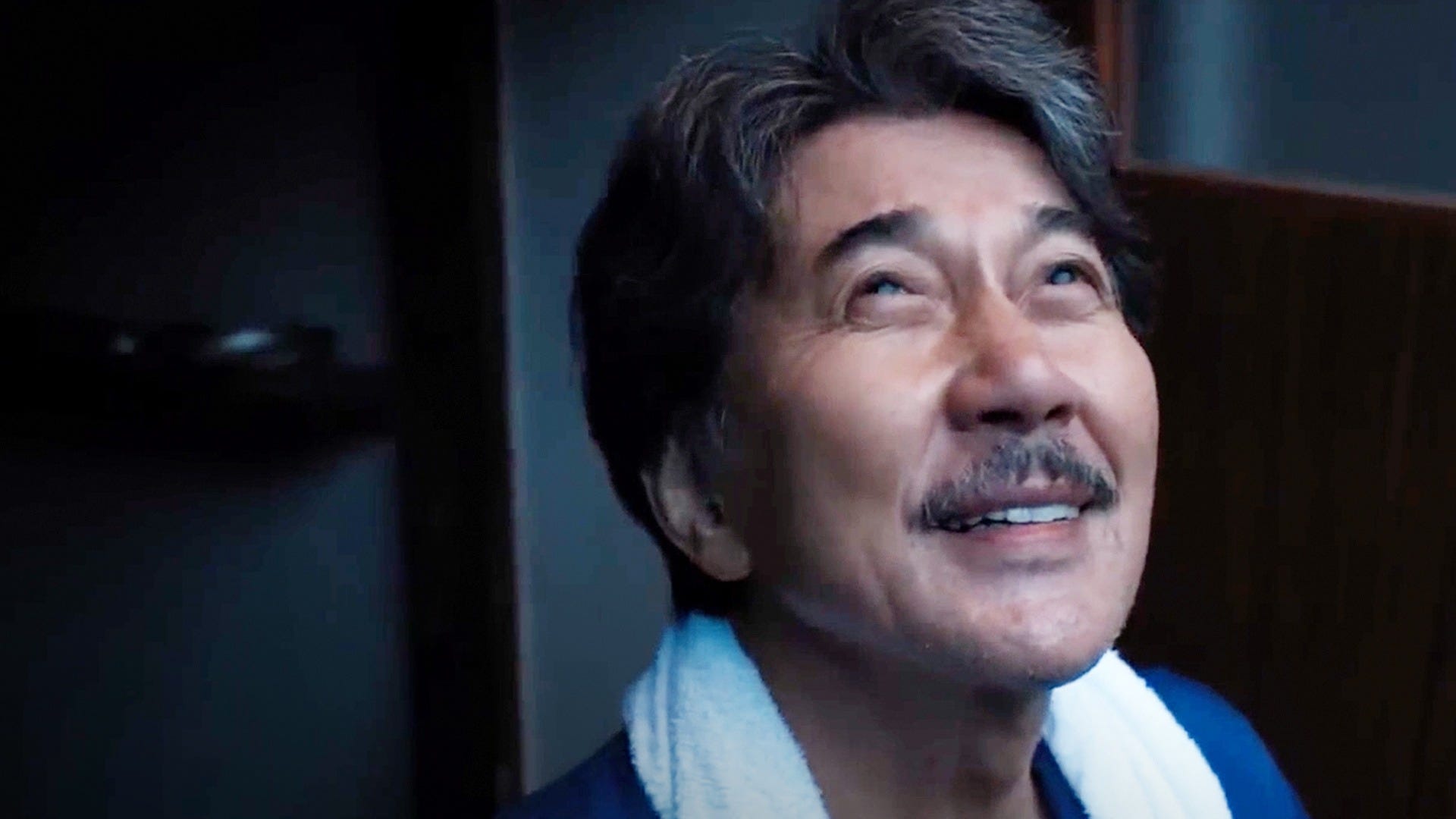
“Perfect Days” – An unexpected late-career gift from Germany’s Wim Wenders, with the epic lyricism of “Wings of Desire” packed into the tiny but resonant story of Hirayama (Cannes Best Actor winner Kōji Yakusho, above), whose daily job cleaning public toilets in Tokyo’s Shibuya district gradually acquires layers of contentment and cosmic grace. The toilets themselves – whimsically functional art installations created for a civic project by an international cast of designers – possess their own magic, and Hirayama’s backstory emerges against a backdrop of daily repetition that deepens into a kind of poem, the rhymes of living varied by small disasters, random joys, and encounters with other people. Comparisons with Jim Jarmusch’s “Paterson” are inevitable: Both movies are working-class Zen parables. But Wenders folds in rock ‘n’ roll chestnuts – Hirayama’s preferred listening as he drives from john to john – with Lou Reed’s “Perfect Day” eventually emerging as the movie’s mantra. “Perfect Days” is a reminder that film, like life, is a transcendent experience when you’re paying attention, and at its center is a sweet, deadpan performance that blossoms at last into a universe of feeling. (Broad release in 2024.)
“May December” – Two women mirroring each other, fighting over the same persona; one needs it for art, but the other needs it to live. Their family and friends? They’re just collateral damage. Todd Haynes’ tricky melodrama plays shifting games of sympathy, satire, tragedy, and farce, and you can argue all night about which character is worse and which actress is better. It’s a stalemate until the very end: Natalie Portman’s Elizabeth, a Hollywood star studying her next subject the way a lizard studies a bug, versus Julianne Moore’s Gracie, sacrificing everyone in her life to the soap opera narrative inside her head. It’s a movie very much about performance and about the damage that performing can wreak when it comes down off the screen to infect real life. Especially to those too young or naïve or kind to know how to perform: One’s children, perhaps, or the husband one took when he himself was a child and who, as played with heartbreaking vulnerability by Charles Melton, has finally begun to wake from the tabloid dream that sustains his wife. (Streaming on Netflix.)
“Past Lives” – One of the early high points of 2023 for me was sitting in a Sundance screening of Celine Song’s debut film as a room full of hardened journalists melted into a puddle of happy-sad tears. It’s a small and defiantly handmade drama about roads never taken and selves not explored – selves that stay with you like a phantom limb, or a language you only speak in your sleep. Greta Lee is at the center of a gentle, helpless triangle of emotion as a Korean girl grown into a New York City woman, her childhood sweetheart (Teo Yoo) holding purchase on a corner of her heart even as her husband (John Magaro) fills the rest with the common stuff of daily life and love. It’s an easy movie to overhype, and yet there are moments I still roll around in my mind: The writer’s retreat at dusk, a conversation between husband and wife in the gray light of a midnight Manhattan bedroom, the bar scenes that bookend the film, and a farewell that’s like releasing a paper boat to a river before stepping back into it yourself. (For rent on Amazon, Apple TV, YouTube, and elsewhere.)
“The Zone of Interest” – Hannah Arendt’s banality of evil, seared onto film. Refashioned from Martin Amis’ 2014 novel by Jonathan Glazer, a skilled stager of cinematic nightmares (“Sexy Beast,” “Under the Skin”), “Zone” focuses on a middle class German husband and father (Christian Friedel) and his wife (Sandra Hüller), the former intent on his work, the latter occupied with keeping house and raising their five children. But the year is 1943, the place is Auschwitz, and the husband is the camp’s commandant, Rudolf Höss, charged with the gassing of Jews as they arrive by train from all over Europe. He’s very good at his job; the Reich promotes him to a position overseeing all the death camps, but his wife balks at moving back to Berlin, and this small domestic turmoil unfolds against the smoke of burnt flesh against the sky and the sound of screams and gunshots on the other side of the wall. “The Zone of Interest” verges on gimmickry, and at least one critic has dismissed the film as “Holokitsch,” but it remains a brutal dissection of complicity, willful blindness, and the human knack for ignoring great crimes as they are carried out right in front of us. (In theaters.)
“The Holdovers” – An intentional throwback to the character-based comedy-dramas of the Me Decade, shot on digital but made to look slightly battered after one too many runs through the projector (as are we all). Paul Giamatti turns in another gem of wounded comic dyspepsia as a classics master at a 1970 New England prep school, stuck over the Christmas holidays with one grieving lunch lady (the divine Da’Vine Joy Randolph) and one pain-in-the-ass Holden Caulfield wannabe (Deerfield Academy’s Dominic Sessa, graduating to the big time with class). It’s probably Alexander Payne’s gentlest movie, which sounds like a slam but isn’t: The script and the performances don’t have teeth so much as teeth marks from life’s relentless chomping and the moral, such as it is, is that loneliness deserves company on the road to disappointment. Don’t ask me how this is the feel-good movie of the season – a holiday diamond wrapped in a blue essay book – but it is. (And, for pity’s sake, someone give Giamatti an Oscar already.) (In theaters and for premium rental on Amazon, Apple TV, YouTube, and elsewhere.)
“Killers of the Flower Moon” – A lot of people think Martin Scorsese makes crime movies when he’s really just fascinated by the psychology of criminal men: their justifications and their selfishness, their stupidity and guilt. So it’s either a shame that “Killers” spends less time with the oil-rich Osage tribesmen and women of 1920s Oklahoma than with the white land barons who murdered them, or the movie simply represents a great filmmaker returning to what to him are the only subjects that matter: sin and its toll upon the human soul. Leonardo Di Caprio buries his star charisma beneath the mask of a spineless man doomed to love the woman he’s poisoning, Robert De Niro is a smiling sump of civic corruption, and Lily Gladstone is the film’s immovable conscience. Among other things, “Killers” is about the American gift for turning crimes into entertainments – a charge that embraces us all and the movie itself – and the final images are an unforgiving reminder of who paid the price. (In theaters and for premium rental on Amazon, Apple TV, YouTube, and elsewhere.)
“The Boy and the Heron” – Hayao Miyazaki’s final movie – he says, and at 83 he may even be right – is both his most personal and his most surreal, the story of a boy in wartime Japan searching for his mother in an upside-down wonderland of killer budgies and infinite doorways. We’ve wandered far from 1988’s children’s classic “My Neighbor Totoro” by now and into a landscape of private myth; “The Boy and the Heron” is at times more sensation than sense, and yet, like “Spirited Away” (2001) and “Howl’s Moving Castle” (2004), it’s held together by the gorgeous rigor of its imagery and the intensity of its recalled emotions. Miyazaki is and will remain a towering figure in animation history, but he has never lost sight of the young boy who drew cartoons as a way out of and back into a painful real world. Now an old man, he graces us with a mystical farewell that should grow in resonance and depth long after he’s gone. (In theaters.)
“Anatomy of a Fall” – What’s remarkable about Justine Triet’s thoroughly engrossing drama about a dead husband and an accused wife is the way so many ideas and themes are elegantly packed into the framing timbers of a courtroom mystery: The human itch for a narrative, the way the media casts women as victims or villains (and nothing else), the unknowability of a marriage, and much, much more. Holding it together is Sandra Hüller (see “The Zone of Interest,” above) in a herculean performance that ventures out to the emotional stratosphere but always comes back to a place of dogged certainty and strength. Which of course is suspicious in itself. Did she or didn’t she? What you decide may tell you everything about yourself. With Milo Machado Graner, very touching as the couple’s blind son straining to see the truth, and Messi, a seven-year-old border collie whose performance won the Palm Dog at this year’s Cannes Film Festival.
“All of Us Strangers” – With 2015’s brilliant “45 Years,” writer-director Andrew Haigh let us into the heart of a wife (Charlotte Rampling) abandoned by her husband for the ghost of a dead girlfriend. In Haigh’s spectral new film, the ghosts are even more present. Andrew Scott (blessed and cursed to be known forever as the “hot priest” in TV’s “Fleabag”) plays a man inhabiting a high-rise apartment building apparently empty except for one other tenant, a rough, seductive customer played by Paul Mescal (blessed and cursed to be known forever as Connell of TV’s “Normal People”). Their nights are spent together; by day, Scott’s character journeys to the suburbs, where he visits with the shades of his parents (Claire Foy and Jamie Bell), dead in a car crash 30 years earlier. Adapting Taichi Yamada’s 1987 novel, Haigh filmed the parents’ scenes in his own childhood home, and the result is a dreamlike drama of reconnection and reconciliation, a deeply profound film in both its understanding of loneliness and its belief in hope. (In theaters.)
“Barbie” – A blockbuster comedy almost as good as what it detonated in the culture: a return to gathering in movie theaters en masse; a pungent, plangent girls’ night out; the biggest box office success (by far) from a woman director. Maybe the most welcome surprise of “Barbie” is that an idea requiring a huge leap of faith from mainstream audiences – the toys you played with as children in the service of a smart, gonzo fantasy about doll dreams versus a woman’s adult reality – was embraced without hesitation as a source of campy enjoyment and blistering home truths. Whenever “Barbie” threatens to turn didactic, it swivels into delightful insanity; whenever it starts to float off into the ether, director Greta Gerwig, star Margot Robbie, and crew remind us of what’s at stake: Security, sisterhood, selfhood. A triumph of pointed pop art from its day-glo production design to Ryan Gosling’s sweet, dim, dangerous Ken, “Barbie” is in some senses the apotheosis of modern Hollywood moviemaking: A work of corporate product placement that’s also an indie toy story. Everyone wins. Especially Mattel. (Streaming on Max, for rent on Amazon, Apple RTV, YouTube, and elsewhere.)
“Bottoms” – Sure, everyone will be talking about “Barbie” and “Oppenheimer” 20 years from now, but they’ll probably be watching this scurrilously funny comedy about high school lesbians who start a fight club so they can hopefully get laid. Is it a great movie? Not even. Is it full of rude, janky high spirits in a popular culture that has been swamped by Tiktok videos and beaten down by viral rage? You betcha. The good news is that director Emma Seligman and star Rachel Sennott carry their collaboration from “Shiva Baby” (2021) to lunatic new heights; the better news is that Ayo Edibire, the endearing sous chef of “The Bear,” is a breakout comic talent as the woebegone Eeyore of the central duo. “Bottoms” soars way over the top in its final scenes but it retains a scrappy, rebellious glee that positions it as “Barbie”’s ass-kicking little sister. (Streaming on MGM+, for rent on Amazon, Apple RTV, YouTube, and elsewhere.)
“The Taste of Things” – Not since 1987’s “Babette’s Feast” has a movie enveloped the taste buds and lit up the gustatory cortex like Anh Hung Tran’s rhapsodic ode to food and love, two sensations that blend harmoniously into one in this long, delicious film. It’s French, of course, with Benoît Magimel cast as Dodin-Bouffant, a fictionalized version of the famed 19th-century gastronome Brillat-Savarin, and Juliet Binoche as his cook and lover Eugénie. (The two actors were married for five years around the turn of the millennium, and their scenes together have the glowing rapport of intimates.) The gastronome has proposed marriage to the cook any number of times over the years, but she has always turned him down, because for her preparing food together – as in the luxuriant 38-minute opening scene, a banquet in itself – is their marriage. An almost scandalously sensual film, but one rooted in an innocence represented by the young Bonnie Chagneau-Ravoire as a kitchen helper and culinary Mozart. (In limited release; broader release om February 9, 2024).
“Kokomo City” – I truly, truly wish everyone on Earth currently freaking out about trans people would watch D. Smith’s fabulous documentary about four transgender sex workers in New York and Georgia: Daniella Carter, Dominique Silver, Koko Da Doll, and Liyah Mitchell. Bawdy, sad, honest, tough, and vulnerable, the tales they tell about their male clients – many of them married and “straight” – expose a broad field of social hypocrisy, especially in the Black community. Smith, herself a Grammy-winning singer-producer who was marginalized by the music industry after coming out as transgender, elicits immense sympathy for these defiantly funny and soulful women, never letting us lose sight of the imaginary threat they represent to a culture violently paranoid about policing gender and the very real threats they face on a daily basis. Indeed, the film is dedicated to Koko Da Doll, who was shot to death last April, the third Black trans woman killed in Atlanta this year. (For rent on Amazon and Apple TV for 99 cents! And also on YouTube and elsewhere.)
“Rewind and Play” – A lesson on how film tells different stories depending on who’s putting the pieces together. In 1969, a French television network broadcast a half-hour documentary about jazz giant Thelonious Monk. Over 50 years later, the French-Senegalese filmmaker Alain Gomis waded through the outtakes and assembled a new hour-long documentary that damningly lays bare the cultural and racial assumptions of the special’s host, Henri Renaud, and, indeed, the limits of the documentary form itself. Framed by the show as a kind of noble musical savage, Monk responds by retreating into himself, a gnomic figure at the keyboard pulling incantatory chords out of the air. Asked to play something mid-tempo to round things out, the pianist lights into a tauntingly fast rendition of “Nice Work If You Can Get It.” “Rewind and Play” is nice work, and now we’ve got it. (For rent on Amazon and Apple TV.)
“American Fiction” – The pitfalls are many in this adaptation of Perceval Everett’s novel “Erasure,” about a Black novelist (Jeffrey Wright, never better) who, fed up with “Black trauma porn” swamping the literary market, writes his own crass genre entry as a joke, only to see it soar up the best-seller lists. (Pop quiz: Is the movie a success or a failure if the ones laughing hardest are the white arthouse audiences director Cord Jefferson so neatly skewers?) What keeps “Fiction” from capsizing is the full-blooded family drama – deaths, marriages, love found and lost — that surrounds the cranky hero and serves as the film’s own rejoinder. Featuring terrific supporting performances – Sterling K. Brown needs to get nominated for something as the brother – a ruthlessly sharp comic scalpel, and an ending worth arguing over. (In theaters.)
“You Hurt My Feelings” – The problems of upper-middle-class New Yorkers don’t matter a hill of beans in tempest-tossed 2023, and yet Nicole Holofcener and her four-cornered cast deliver one of the year’s most disarmingly human comedies of neurosis and acceptance — it’s as if a Woody Allen made a movie with actual people. Julia Louis-Dreyfus is a novelist (again with the novelists!) who overhears her psychiatrist husband (Tobias Menzies) regretfully trash-talking the manuscript he’s been praising to her face, upon which every aspect of their decades-long marriage comes under scrutiny. The movie’s about the lies we tell our loved ones to make them feel better and the truths we’re afraid they’re not telling us. In her third decade as a writer-director, Holofcener has become the bard of the chattering classes, puncturing their bougie illusions with clarity and compassion. (For rent on Amazon, Apple TV, YouTube, and elsewhere.)
“Are You There, God? It’s Me, Margaret.” – The flip side of “Barbie”: A perceptively comic/deadly serious story of a girl’s transition to womanhood and a woman’s rediscovery of herself. Adapting the indestructible Judy Blume YA novel – still being banned and thus still necessary 53 years after it was published – director Kelly Fremon Craig (“The Edge of Seventeen”) finds the right balance of anxiety and empathy as 12-year-old Margaret (Abby Ryder) copes with bras, periods, snotty classmates, and boys, while her mother (Rachel McAdams) copes with high-pressure PTA moms and her own parents, who’ve disowned her for marrying a Jewish guy (Benny Safdie). About as good as the genre gets, “Are You There, God?” is a fine mother-daughter double-date lesson in the art of making it up as you go along, with plenty of missteps and moments of serendipity. (Streaming on Starz, for rent on Amazon, Apple TV, YouTube, and elsewhere.)
“Godland” – One of the year’s most visually ravishing experiences, this granitic Icelandic epic has echoes of Bergman, Dreyer, Herzog, Bresson – all the mad doubters of world cinema. The writer-director is Hylner Pálmason, making his third feature and first major work; set in the early 1900s, it follows a young Danish priest (Elliott Crosset Hove) whose arduous voyage to Iceland turns him from a mild-mannered mystic to a wild-eyed zealot. “Godland” traffics in elusive meanings and sudden lurches of beauty and chaos; it’s a film that feels carved from the earth itself, with a long-range view of the landscape and man’s brief, impermanent place in it. Pálmason isn’t yet 40; “Godland,” by contrast, feels older than time. (Streaming on The Criterion Channel, for rent on Amazon, Apple TV, and Vudu.)
“20 Days in Mariupol” –AP reporter Mstyslav Chernov documents the opening days of Russia’s invasion of Ukraine in February 2022, a historical moment that now seems unimaginably distant. This is exemplary first-person journalism, though, and crucial evidence of war crimes carried out from afar on innocent civilians. “20 Days” provides a chronological throughline and a personal aspect in the journalist’s own tremulous voiceovers, and while you’ve seen some of this footage on the nightly news, with any luck it’ll screen some day at the Hague. It’s one more installment in a horrific new genre, the latest chapter of which should be arriving from Gaza any day now. (For rent on Amazon, YouTube, and elsewhere.)
Also-Rans: Films That Probably Would Be On the Above List If You Asked Me On A Different Day. (All titles are linked to their trailer.)
“Afire”
“Eileen”
“Little Richard: I Am Everything”
“Maestro”
“Rye Lane”
“Still: A Michael J. Fox Movie”
Films I Never Got Around to Seeing But Probably Should Have.
“Ferrari”
“R.M.N.”
Films That Everyone Seems To Love Except Me.
“Orlando, My Political Biography”
“Passages” — Having a main character who’s a shit is one thing, but I draw the line at a tedious shit.
“Saltburn”
The last third of “Oppenheimer”
Comments? Outraged objections? Please don’t hesitate to weigh in.
If you enjoyed this edition of Ty Burr’s Watch List, feel free to pass it along to others.
If you’re not a paying subscriber and would like to sign up for additional postings and to join the discussions — or just help underwrite this enterprise, for which the author would be eternally grateful — here’s how.
You can give a paid Watch List gift subscription to your movie-mad friends —
Or refer friends to the Watch List and get credit for new subscribers. When you use the referral link below, or the “Share” button on any post, you'll:
- Get a 1 month comp for 3 referrals
- Get a 3 month comp for 5 referrals
- Get a 6 month comp for 25 referrals. Simply send the link in a text, email, or share it on social media with friends.
There’s a leaderboard where you can track your shares. To learn more, check out Substack’s FAQ.



